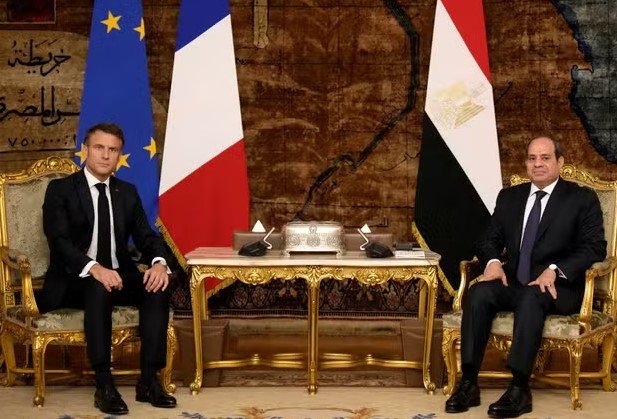Tensions between Israel and France have reached new heights following Israel’s decision to revoke the visas of 27 French members of parliament (MPs) slated to visit the country. This diplomatic rift comes as the lawmakers were set to meet with Palestinian officials in an effort to discuss the recognition of a Palestinian state.
The controversy has sparked widespread reactions, with Jerusalem warning of further diplomatic fallout in June. Israel’s move to block the visit is seen as a direct response to the growing pressure from certain European leaders, including French President Emmanuel Macron, who has been vocal about the need for progress on the Israeli-Palestinian issue. Israel is already bracing for potential clashes in diplomatic relations, which have been on the decline for some time.
The Controversial Visit and Its Aftermath
The delegation of French MPs, primarily from left-wing parties, had been invited by the French consulate in Jerusalem to visit both Israel and the Palestinian territories. Their planned itinerary included meetings with high-ranking officials from the Palestinian Authority, as well as visits to security prisoners, most notably Marwan Barghouti, a prominent figure in Palestinian politics.
The timing of the visit raised alarms in Israel, which views such gestures as a form of support for the Palestinian push for statehood. Israeli officials argue that the MPs’ visit could undermine Israel’s position in the ongoing conflict and the broader diplomatic efforts surrounding the peace process.

Israel’s decision to refuse the delegation entry has prompted a swift backlash from France, with many lawmakers and political commentators criticizing the move as an overreach in diplomatic relations. The French government, particularly President Macron, has expressed disappointment, with Macron reportedly reminding Israeli Prime Minister Benjamin Netanyahu that Israel was founded on the basis of a UN resolution, a remark seen as a subtle jab at the Israeli government’s stance on Palestinian recognition.
A Diplomatic Crisis in the Making
The revocation of the French MPs’ visas highlights the growing tensions between Israel and European nations over the issue of Palestinian statehood. In recent months, several European governments have shown increasing support for Palestinian sovereignty, with some even recognizing Palestine as a state in a symbolic gesture aimed at pressuring Israel to change its stance.
Israel’s refusal to host the French delegation underscores the deepening divide between the two nations. Jerusalem insists that any attempts to bypass direct negotiations with Israel in favor of supporting Palestinian statehood are counterproductive and will only further entrench divisions. Israeli officials also expressed concerns that such visits could encourage further international pressure on Israel, potentially isolating it on the world stage.
Macron’s Remarks and the Growing Frustrations
President Macron’s recent comments about Israel’s founding based on a UN resolution have further exacerbated tensions. His statement, which implied that Netanyahu should not forget the international basis for Israel’s creation, was viewed by Israeli officials as a thinly veiled criticism of Israel’s policies, particularly regarding its stance on the Palestinian territories.
The comments have raised questions about the future of Israel-France relations, especially as both countries are important allies within the European Union. Macron’s position on the Palestinian issue has increasingly diverged from Israel’s, and the refusal to allow the French MPs entry into Israel may mark a turning point in their diplomatic relations.
Israel has long maintained that any solution to the Israeli-Palestinian conflict must be reached through direct negotiations, rather than unilateral moves or external pressure. This has been a central tenet of Israeli foreign policy for decades. The growing number of European nations recognizing Palestinian statehood, however, has put Israel in a difficult position, particularly as it faces increasing isolation on the global stage.
The Potential for Further Diplomatic Strains
The ongoing tensions between Israel and France are not expected to dissipate quickly. Israeli officials have indicated that the country is prepared for a diplomatic clash with France in June, when the French government is expected to push forward with its own initiatives aimed at recognizing Palestine. The planned clash could further escalate tensions and complicate the broader dynamics of the Middle East peace process.
While the French MPs’ visit was meant to be a diplomatic gesture, it has instead become a flashpoint in the broader debate over the Israeli-Palestinian conflict. Israel’s decision to block the visit has made clear that it will not tolerate international interference in its negotiations with the Palestinians, and this stance may further alienate European partners who are pushing for a more assertive approach to Palestinian recognition.
What’s Next for Israel and France?
As tensions continue to rise, the international community is watching closely to see how this diplomatic standoff will play out. Israel is unlikely to back down from its position, especially given the sensitive nature of the Palestinian issue. Meanwhile, France will likely continue to push for a resolution that recognizes Palestinian statehood, potentially leading to further diplomatic conflicts with Israel.
The clash between Israel and France is not just about a visit; it is a reflection of the broader geopolitical struggle over the future of the Middle East and the role of international diplomacy in resolving the Israeli-Palestinian conflict.
